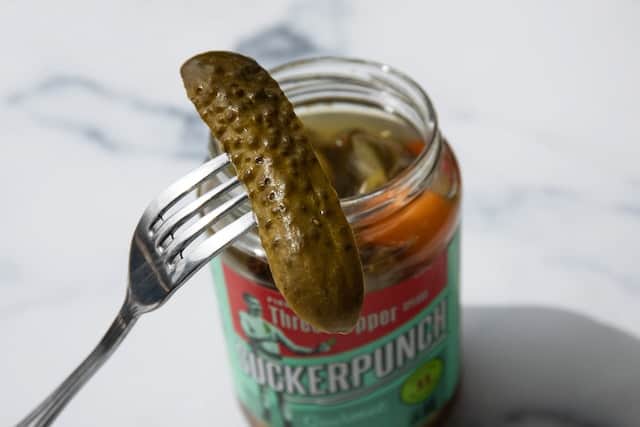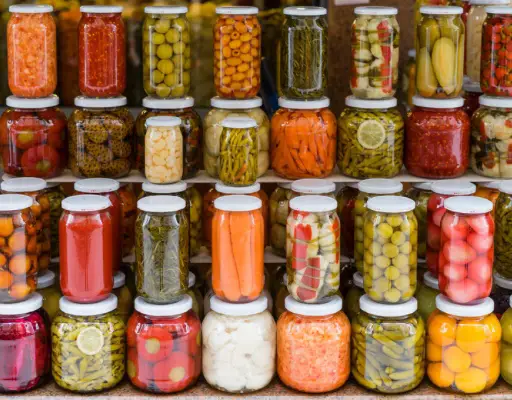Lets end the confusion on whether or not dill pickles need to be refrigerated.
This article explains the best way to store canned dill pickles as well as jars of canned dill pickles that have been opened. In the end, it also explains the method you can use to identify pickles that have gone bad.

What are dill pickles?
Dill pickles are simply pickles that have the dill flavoring added to them either through the dill seeds or dill weeds (fresh or dried).
Dill pickles are almost always fermented; i.e. kept in a cool dry place to sit for weeks, which gives them their characteristic sour taste, but they can be added with sugar to improve on the sourness.
What do dill pickles contain?
The classic dill pickle is made by dissolving salt in water and vinegar (without heating) and pouring the mixture over a freshly prepared cucumber and flavoring mix (dill seeds or weeds plus garlic and mustard seed) contained in a jar or fermenting container until they are fully submerged.
The mixture is then covered with a weight and cloth allowed to cure for weeks on end at temperatures between 70 to 75 F in order for the cucumbers to develop sour flavor.
The process of curing is what gives the cucumbers a sour taste and the longer the veggies are allowed to sit and ferment, the more the product turns sour.
Dill pickles are almost always canned after fermentation so that they can be stored for longer durations.
For canning, the brine they’re contained in is brought to a boil in a sauce pan and then simmered for 5 minutes.
Then the cucumbers are transferred to a canning jar and the brine is poured over the cucumber with a 1/4 inch head space at the top ensured to allow for the expansion of the vegetables during processing.
Afterwards, the lid is adjusted and the jars are processed.
Canned dill pickles will keep forever
In the production of dill pickles, it is typically an option to choose to can them. An alternative way is to store them in their fermented jars in the refrigerator.
If canned, then the pickles would be able to keep indefinitely on the counter so long the seal isn’t broken and they are canned and stored properly (in a cool dry place away from sunlight which will speed up the rate of rate of oxidation and deteriorate the product, and also cause a loss of vitamins).
The recommended use by date is, however, capped at 1 year because after that mark, the product quality would begin deteriorating by an increasing percentage year by year.

This rule doesn’t only apply to homemade pickles, even store bought pickles would keep indefinitely so long their seal is intact.
Dill pickles can be refrigerated
While dill pickles that are canned can be stored outside in cool dark dry areas, you can still choose to store them in the refrigerator provided yours has the space to accommodate the jars you have.
Storing jars of pickles shouldn’t be a concern with most modern fridges as they are built with really large spaces for storing food items, unless you’re dealing with a really large batch of pickle jars in which case storing them outside in dark and cool areas would be the best solution.
Canned pickles stored in the refrigerator would keep indefinitely, and the rate of spoilage would be slowed even more as certain processes that cause spoilage in food items are naturally slowed down at refrigeration temperatures.
Opened canned dill pickles must be refrigerated
Now everything swiftly changes the moment you open the canned pickles.
This is because once opened, the surface of the brine is now exposed to the air which could be carrying spores or sprouts that would settle on it and begin to breed.
Even your fingers or utensils that you use to retrieve a pickle from the jar could be contaminated with spores or vegetative sprouts (of microorganisms) which would now gain access to the medium and increase the risk of spoilage.
In order to slow down the rate of breeding of the spores or bacteria, you must refrigerate the pickles, where they will be able to keep for up to a year, but the best time to put them to use is within the first 2 months of storage.
Dill pickles that aren’t canned or sealed must be refrigerated
If you never fancied to can your fermented dill pickles in the first place, then you probably are storing them in their fermented vessels or jars.
Such pickles must be treated as refrigerator pickles or quick process in terms of storage and put inside the fridge to store.
Keeping them outside after fermentation is complete means they would be able to breed bacteria and mold which would cause them to spoil quickly.
You want to put them in the refrigerator where they will be able to keep for up to 4 months.
Can dill pickles be left out overnight?
If you open a jar of dill pickles, then it’s always recommended that you put it inside the refrigerator immediately in order to halt the growth of bacteria and fungus it may already be harboring.
If you accidentally leave a jar of pickle (that has been opened before) overnight, then how quickly it begins to spoil depends on the ambient temperature.
If the ambient temperature is above 75°F, then there is a high likelihood some bacteria activities have begun, and the best thing would be to discard the contents of the jar and sterilize the jar itself, because pickle juice is almost always a hotspot for the bacterium Clostridium botulinum which can produce toxin that can be very deadly when consumed.
If the temperatures are a bit lower, then you might have some luck, but for most people, especially those that are compromised, the best option would still be to get rid of the contents of the jar completely.
Can you freeze dill pickles?
If refrigeration doesn’t sound like a good enough preservation technique, then you can decide to go the route of freezing.
Freezing however, isn’t recommended because it destroys the textual integrity of the cucumber, and it also affects taste.
Freezing dill pickles is quite easy.
Simply transfer the contents of the jar into a plastic bag that is freezer safe and put it at the back of the freezer.
When it’s time to thaw the pickles, all you have to do is bring them down into the refrigerator compartment overnight and they should be perfectly thawed the next morning.
Frozen pickles will last indefinitely, but are best purposed within the first 2 months of storage.
How to tell if dill pickles are bad
The quite obvious way you can use to tell if canned dill pickles are bad is by looking out for a bulging lid.
This indicates the activities of microbes inside the food that is causing gas which is applying pressure on the lid from the inside and causing it to bulge.
You can go ahead and open it to see if there is any microbial growth i.e mold, and also check to see if the pickle gives an offensive odor. If it does, make sure to throw out the jar with the contents inside. Or better still, sterilize the jar.
While inspecting for spoilage, take note that a change in color of pickles does not necessarily mean that the pickle is spoiled, especially when the pickle has been stored for a very long time.
As food ages, especially canned products, they deteriorate in quality and appearance although the safety is never compromised as long as the seal is intact.
A rule of thumb
One golden rule to always remember with regards to keeping your jars of pickles safe all the time is to make sure you’re taking out the pickles using a clean utensil like fork rather than using your fingers.
Your fingers, especially with nails on them are likely hotspots for bacteria, so introducing them into the medium means the bacteria they carry will have a chance to get into the medium, breed and begin to cause spoilage, or if pathogenic, pose threat to the health when consumed.
Frequently Asked Questions
Do All Types of Pickles Need Refrigeration?
There are three main categories of pickles: fermented, vinegar-based and quick pickles.
Fermented pickles rely on naturally occurring bacteria on the surface of the pickled item to produce lactic acid, which gives them their tangy flavor and allows for preservation.
These types of pickles include traditional dill and kosher dill varieties that we just talked about. Vinegar-based pickles are made by immersing vegetables in a brine solution composed of vinegar, salt, sugar, and spices and then left to sit for many weeks to develop flavor (but not ferment per-say), while quick pickles aren’t even fermented to begin with.
When it comes to refrigeration of the different types of pickles, here’s what you should know.
Fermented Pickles: These should always be stored in the refrigerator once opened to maintain their crisp texture and prevent spoilage. Unopened jars can be kept at room temperature but should be transferred to the fridge after opening.
Vinegar-Based Pickles: If unopened, these can typically be stored at room temperature for an extended period due to their acidic environment. However, once opened, it’s best to store them in the refrigerator as well. This helps retain their crunchiness while also slowing down any potential bacterial growth.
Quick Pickles: These aren’t meant to be fermented, thus must be stored in the refrigerator promptly after making them.

